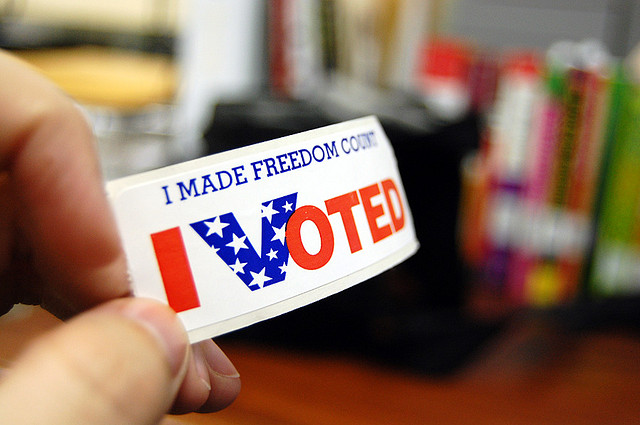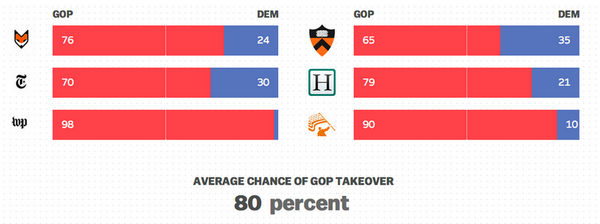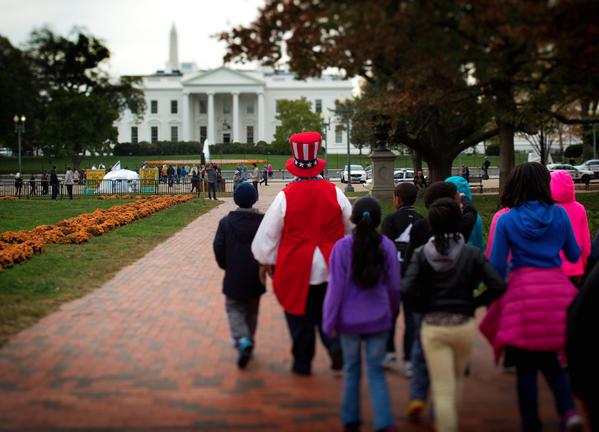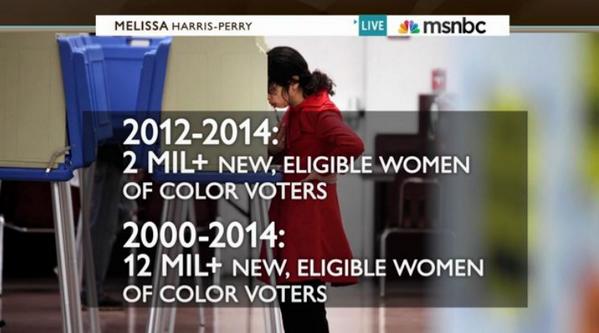
Have you voted today? Kelley Minars, Flickr (Creative Commons).
With only six seats needed to give Republicans control of the United States Senate, all eyes are on the upper house for this year's midterm elections.
Neon Tommy talked to residents of the states with the most contentious Senate races, hoping to give readers a snapshot into the nation during a time of possibly great political change.
Alaska: “It’s just a regular day. I didn’t feel anything different, actually.”
On her drive to work, Dawee Lor hardly noticed that it was Election Day.
“No one really talks about politics here,” said Lor, a worker at Alaska Wild Berry Products. On the drive, she says she only saw a few people on the street campaigning.
U.S. Senator Mark Begich (D, Alaska) holds one of the most vulnerable positions in the 2014 midterm elections. It’s been a neck-and-neck race between him and Republican challenger Dan Sullivan.
But the mood in Alaska is not so hot.
“It’s just a regular day," said Lor. "I didn’t feel anything different, actually.” She said her friends and family have hardly even touched the topic. And customers have been more focused on buying products than taking a dive into politics.
There is a strong chance that Begich will lose to Sullivan, who is running under the Alaskan Republican Party. Begich’s support for the Affordable Care Act has already alienated much of the population and his position as a Democrat in a Red-dominated state does not help at all.
SEE ALSO: MIDTERM WATCH: Hottest Races Across The Country
Despite the setbacks, political analysts believe the race will come down to a few percentage points. So Begich has decided to endorse Libertarian candidate Mark Fish. He hopes that this will help sway voters away from Sullivan.
But the New York Times puts Begich’s chances of winning at a dismal 34 percent. Alaska is just one of the many states, along with Iowa, Colorado and Louisiana, that are looking to turn red today.
— Benjamin Dunn
Colorado: “I’d hate to see the state go red.”
It’s 11 a.m. on Election Day, and Charlie’s Denver, a gay bar located in downtown of the state’s capital, is just opening up.
The manager, Charlie Milms, has owned the establishment since 1983. At that time, Colorado was a rural haven dominated by the Republican Party. As cities in the state began to grow, however, the state turned increasingly liberal and Democratic.
“As a member of the gay community, seeing the state turn blue has been awesome,” he said. “Back in the day when I started the bar, it was really different—this place would turn a lot of people’s heads.”
In this year’s midterm elections, it seems the state is once again at a political turning point. Currently, Republican challenger Cory Gardner leads against Democratic incumbent Mark Udall in the polls for the state senate race.
Much of the campaign has centered around women’s reproductive rights, with Udall issuing a string of attack ads combatting Gardner’s opposition to abortion and birth control.
“The main thing being talked about here is abortion,” Milms said. “I don’t like the way the GOP are trying to get abortion knocked out—that’s a woman’s right. It’s only fair.”
For Milms, a Republican Colorado is a real fear.
“I want to keep Colorado Democratic,” Milms said. “I’d hate to see the state go back to red.”
— Matt Lemas
Kansas: “At least with Republicans in the House, a change is possible…”

(Vox/Twitter)
Tillie’s Flower shop has been a mainstay in Wichita, Kansas for 138 years. For 82 of those years, there have been no questions as to who would win the midterm election race. Owner Ken Denton has never had to think twice about the outcome: Republican. That is, until now.
“I think in general, most people are just really unhappy with Washington,” he said. “And you can see that in the polls.”
This year, Independent candidate Greg Orman is giving incumbent Republican Pat Roberts a run for his money. In a poll conducted Monday, Orman led voters 47 percent to Robert’s 46 percent. But many voters, like Denton, are confused by Orman’s message.
“No one really knows who Orman is,” he said. “He’s running as an Independent, but people don’t understand he’s really a Democrat.”
Denton described the fears of his employees, who, unsatisfied with changes in healthcare and the economy, will look to Republican leadership in Congress to force government action. Denton himself, cast his vote early: Republican. “If Roberts isn’t successful, the Democrats have a chance, and that’s not a bet I’m willing to take” he said.
As for his prediction for the ultimate outcome: “I think when it comes time to pull the lever, Kansas will end up going Republican. They always do.”
— Kristen Lago
North Carolina: “People are talking more about standing in line for voting than the issues.”
Besides a slew of customers wearing “I voted” stickers, it is business as usual for Charlotte’s Toy’s & Co. toy shop today.
North Carolina is home to one of the closest senate races in the country as incumbent Democrat Kay Hagan looks to defend her seat against Republican Thom Tillis. However, that does not mean voters are overly excited to voice their opinions in this swing state.
“People are wearing their ‘I voted’ stickers as a badge of pride but don’t seem too informed,” cashier Mollie Tepper observed at Toy’s & Co. “People are talking more about standing in line for voting rather than the issues or who they voted for themselves.”
Tepper feels out of the loop herself, as she voted for the familiar face.
“I don’t have too many educated opinions to be honest, but Kay Hagan is more reputable. I just don’t trust Thom Tillis,” Tepper explained.
The most political conversation she overheard from her customers was about the excitement of the campaign advertisements ending.
Although that may sound cliché, North Carolinians were bombarded with political advertisements this Senate race. Kay Hagan spent much of her United States record of over $100 million Senate campaign on advertisements.
According to the Center for Public Integrity, the campaigns and parties ran over 100,000 ads in North Carolina, which was the most in the county.
However, if the rest of North Carolina is as unopinionated as Toys and Co., the millions of dollars on advertisements may not have been worth the trouble.
— By David Tepper
New Hampshire: "Politicians Need To Stop With Ridiculous Charges And Counter-Charges."
Cathy Baker, an administrative assistant at Conway Elementary School in New Hampshire, has one wish: for politicians to stop with "ridiculous charges and counter-charges."
"Turn on the T.V.," Baker said, referencing negative campaign ads. "I want [politicians] to run the country in a productive, efficient manner, rather than finger-pointing."
And yet that's what's going on in the N.H. Senate race between former Mass. Sen. Scott Brown, Republican, and incumbent Sen. Jeanne Shaheen, Democrat. Brown, who moved to N.H. from Mass. after losing the Mass. seat in 2012, followed the same cry as some of his fellow Republicans.
“Are you fed up?” Brown
said to a crowd, playing on Obama’s unpopular handling of issues such as Ebola, ISIS and border security. “Listen, you deserve better.”
Though Brown is a well-funded candidate in a party that is capitalizing on
Obama’s unpopularity, Shaheen, who is N.H’s first female senator and was its first female governor, still retains her popularity. Shaheen is
more well-known in the state and has "done a lot" for her incumbents, according to Baker.
When it comes to what kind of Senator her state needs, Baker believes that she and her fellow New Hampshire residents need a person in Washington who can work across the aisle to improve the economy and affordable healthcare, which is important in areas like Conway that depend heavily on tourism.
“We just want politicians to work together,” Baker says. “It’s for the good of the entire country.”
— Heidi Carreon
Iowa: "It’s definitely split pretty evenly."
It’s 11:00 a.m. at an Iowa bar. But it’s not any average afternoon. Every now and then a customer will burst through the doors with an “I Voted” sticker emblazoned across their chest.
Iowa is up for grabs in this year’s U.S. Senate race. Democrat Bruce Braley and Republican Joni Ernst are neck-and-neck for the seat. As of now, forecasts are predicting the state is leaning 69 percent Republican.
“It’s definitely split pretty evenly—just from overhearing. Even the employees themselves,” says Carmen Rannfeldt, a waitress at 2 Dogs Pub. Rannfeldt’s customers have come in expressing a variety of views.
She says that two of the most prominent issues people have been talking about are Medicare and abortion. Ernst is against abortion and getting rid of Medicare, whereas Barley is advocating the opposite.
Rannfeldt looks forward to getting off of work, when she will vote for Barley. She agrees with his stance on issues such as abortion. But she is also very against Ernst, who wants to get rid of federal student loans. Rannfeldt is a 26-year-old college student attending Mount Mercy University. “My waitress job isn’t going to pay my $2,000 per class,” she says.
She also is against Ernst’s campaign ads that paint Iowa as a stereotypical farming state. In one ad, Ernst starts off by saying, “I grew up castrating hogs on an Iowa farm.”
— Cameron Quon
Georgia: “I wanted to vote, but I didn’t get the absentee ballot.”
The millennial generation isn’t turning out to the polls, but not because they lack the desire to vote. It seems college students want to vote, but the process of requiring an absentee ballot has kept them from voting.
Mitchell Zahariades, a student at The University of West Georgia, says there’s been almost no talk about the election around campus.

(The New York Times/Twitter)
“I don’t even know if there are places around campus where you can vote" said Zahariades. "There’s a polling center at the high school close to campus, but that’s almost a 20-minute walk. You’d definitely have to drive over there if you really wanted to vote.”
With such a close race for the Georgia Senate, both parties need every vote they can get to win the seat. Millennial voters made up 19% of the vote in the 2012 presidential election, according to the
Roper Center.
In order to request a ballot, the voter must print off the request, fill it out, and then fax, mail, email, or present in person the form to their County Board of Registrar’s Office.
Zahariades says he wanted to vote but didn’t even know that he would need to request an absentee ballot until it was three days before the election. “I would have voted if I had the ballot. A couple of my fraternity brothers voted, but that’s just because they’re from this county, so they’re already registered here.”
— Abby Flaxer
Alaska: “It would surprise me if [turnout] exceeded 30 percent, which is pitiful.”
Terri Campbell stood outside a Juneau church before 7 a.m. Tuesday morning, waiting for the polls to open with 10 or so other people.
“It was energetic,” said Campbell, who works for the Department of Education. “There were a lot of people who were trying to get voting in right before they went to work.”
A few hours later when Chris Meade went to the polls, the voter turnout still seemed promising. Meade said it was nice to see people voting but doubts turnout will be high.
“[This year’s turnout] might be slightly higher for a midterm election, but turnout in Alaska has been miserably low,” Meade said. “I wouldn’t be surprised if [turnout] was 25 percent. It would surprise me if it exceeded 30 percent, which is pitiful.”
In the senate race, both Campbell and Meade voted for Democratic incumbent Mark Begich. Republican challenger Dan Sullivan has largely led the polls until recently—new polls have shown Begich in the lead.
So far, voters seem to be coming out to the polls despite what Campbell called an “overwhelming” number of ads, phone calls and flyers.
“The telephone robo-calls have been relentless this year. They have been intrusive and bothersome for many people,” Campbell said. “The TV ads have been mostly slam ads, and that always leaves a bad taste in my mouth. But it’s been on both sides.”
— Sophia Li
North Carolina: “We’re a purple state.”
After accidentally going to the wrong polling place, one North Carolina voter had to get back in her car and drive another five minutes to give voting another shot, but she wasn’t complaining. Other people are going to have a much more difficult time getting to the polls.
“The Republicans came in and changed voting laws that make it more difficult for minorities and underprivileged people to vote,” said Netta Cox, a librarian at a university in Greensboro. The polling places at college campuses are gone, thanks to a measure pushed by the Republicans in the state Senate. Cox saw signs at her polling place notifying voters that they will need a photo ID to vote in 2016.
“The limiting of early voters and cutting back on polling places, especially in disenfranchised and rural areas, it’s messed up,” said Brian Guick, a manager at a Domino’s in Durham.
It’s all part of a GOP-backed Voting Information Verification Act, which was passed last year by the state legislature. Thom Tillis, the Speaker of the House in North Carolina, is the Republican candidate in the tight Senate race in North Carolina. He’s up against Democratic incumbent Kay Hagan. More than $108 million was spent on this matchup, according to the nonpartisan Sunlight Foundation. Yet, the RealClearPolitics poll average showed Hagan up by just 0.7 percentage points going into Election Day.
The divided voters of North Carolina will help decide the balance of power in Congress and President Obama’s ability to accomplish some of his own goals.
“The federal government has been in a stalemate,” Cox said. “I really do think this race is important in changing that.”
— Meghan Coyle
Iowa: “The loudest parts of the campaign seem to lack a lot of substance.”
Election day in Iowa couldn’t have come sooner for resident John Peterson.

(MSNBC/Twitter)
The Iowa Senate race, between Democrat Bruce Braley and Republican Joni Ernst, is a toss-up, but most recent polls favor Ernst.
While Iowa is a key swing state, issues like reproductive rights, health care, and Social Security are not always at the forefront of campaigns or voters’ minds.
According to Peterson, a seven-year employee of Fleur Cinema and Café, many people can’t get past the negativity of campaigns that accuse each other of secret meetings with the Koch brothers.
“The biggest topic of conversation, unfortunately isn’t, 'This candidate would be better for this reason.' People are talking more about the ridiculousness of the campaign.”
Peterson doesn’t have very strong opinions about the candidates, “given how little is being done by Congress in terms of passing laws that actually affect people’s lives.” Issues at the forefront of Senate races nationwide—like reproductive rights, immigration, and gay marriage—do not affect him personally. He supports the Democrats but believes the Republicans will hold onto the Senate.
Peterson doesn’t expect much social change as a result of this race, or in the next two years at all, because “anything passed by Congress isn’t likely to be signed by Obama, and any reform that happens with Obama in office, he’ll get credit for, and good God we can’t let that happen.”
According to Peterson, Iowa is clouded by cynicism over the political and social prospects after the race and about the campaigning itself. The general feeling seems to be, as he says, “anyone who wants to perform a campaign like this is probably not the best person to hold the office for which they’re campaigning.”
— Ciara Lunger
Louisiana: “I miss a lot of the campaigning.”
Alton Cook fears he’s not qualified to comment on the Louisiana Senate race. He doesn’t own a television set, so he hasn’t seen any of the
$27 million spent on TV ads in his state.
But even without seeing the ads, Cook says he feels strongly about the race. “I’m very much a Democrat, and I think it’s very important for Democrats,” he said.
Others think it’s important, too. Much
campaign funding in Louisiana is coming from national groups trying to secure a seat that may be the last deciding factor in which party will control the Senate next year.
Cook thinks Democratic incumbent Mary Landrieu’s chances of winning his home city are high. Landrieu’s brother is the mayor of New Orleans, and so was their father before him. “It’s a political family,” Cook said. “The mayor is quite popular. Evidently her principal strength is here.”
The statewide results are a little cloudier. Louisiana is
predicted to go into runoff elections because of the state’s “jungle primary” system. Elections are nonpartisan, so Landrieu faces two Republican opponents today: Bill Cassidy and Rob Maness.
“Cassidy is evidently a middle-of-the-road Republican, and the other man, whatever his name is, is a right-wing guy,” said Cook.
The Louisiana Republican Party backs Cassidy, and polls
predict that he may be able to edge out Landrieu in a runoff election, but the race will be tight. Both Republican and Democrat committees are preparing for high-stakes showdown, meaning Cook will miss at least
$8 million in more shots fired on TV.
— Gigi Gastevich
Kansas: “I Wish I Had A Different Candidate Pool.”
The Little Shop of Flowers in Pittsburg, Kansas is gearing up for the Christmas season. Although the environment in the floral shop is full of holiday cheer, florist Mary McClaskey could not be less cheerful about the impending Senate election results.
“It was sad this morning when I cast my vote because I was unhappy with both of the candidates,” said McClaskey. “I wish I had a whole different candidate pool.”
“Orman has cheated people and Roberts has gotten too comfortable,” continues McClaskey.
Kansas has had a Republican representative in the Senate since 1932. Republican incumbent Pat Roberts is running for his fourth term with Independent Greg Orman threatening his position.
Though she wouldn’t say whom she ended up voting for in the Senate race, she did say that many of the issues did not merit her vote: “On some, I left my vote blank because I don’t think the people running deserved it.”
Regarding her thoughts on the potential shift away from a Republican Senator, McClaskey said she couldn’t care less as long as “whoever wins does the job they were elected to do.”
— Cassidy Waters
Colorado: “Everyone wants the race to be over because of the ad campaigns."
The hunt for votes in the Colorado Senate race will end today and one local business owner could not be happier.
Shop owner Crystal Guise of The Twisted Tulip in Denver, Colorado says that the television campaign ads controlling the airwaves across the state between Republican rep. Cory Gardner and Democratic Sen. Mark Udall have been a great source of frustration for residents of her community.
“The ads are more about attacking the other opponent rather than focusing on the issues,” she said. “It’s not about who’s going to actually make a change for the people who live here.”
Ads have asserted that Udall's support of the Affordable Care Act has harmed the lives of Coloradans, while other ads have depicted Gardner as a misogynist whose views on issues related to women are primitive at best.
Despite her frustration with the candidates and campaign spending on ads, Guise went out to vote before opening up her shop at 9 a.m.
“I already voted for Cory Gardner, and I will continue to vote for anyone Republican,” she said.
“I predict the Republicans will take over the senate, at least for local government.”
After moving from Texas to Colorado, Guise started the flower shop business all on her own and said she received no help or support from the government.
Guise hopes that more support of small businesses will be an outcome of the race, and that the government will cut back on the regulations facing small business owners.
“This time I really want change and don’t support a lot of what’s happening now.”
— Brianne Tracy
North Carolina: “ College students don’t know how to vote? I didn’t expect that.”
It's Election Day. For Chris Colby, what's making him excited is not the election itself, but the fact that the entire Colby family participated in voting for the first time.
Colby, who works for a bike shop, had voted with his wife in the past, but their daughter, a freshman at Appalachian State University, had never voted before.
He was surprised at his daughter, who is “still not ready to vote,” when he and his wife went to a local polling station several days ago.
“College students don’t know how to vote? I didn’t expect that,” said Colby.
He said college students should be much more educated involved in political affairs than high school students.
“I don’t care who she votes for,” laughed Colby. “I don’t know much about the candidates myself.”
He and his wife voted for Democratic incumbent Kay Hagan, and their daughter voted for Republican Thom Tillis, after Colby told her how to vote.
“There is no difference today from an ordinary day scene, actually,” said Colby. “ People here talked about the election a lot last week.”
North Carolina saw record early voting turnout, which topped 1.1 million, according to the State Board of Elections.
— Duanli Zhu







